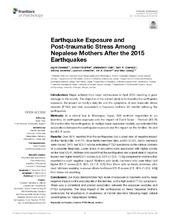Earthquake exposure and post-traumatic stress among nepalese mothers after the 2015 earthquakes
Kvestad, Ingrid; Ranjitkar, Suman; Ulak, Manjeswori; Chandyo, Ram K.; Shrestha, Merina; Shrestha, Laxman P.; Strand, Tor A; Hysing, Mari
Peer reviewed, Journal article
Published version

Åpne
Permanent lenke
https://hdl.handle.net/1956/23408Utgivelsesdato
2019-04-02Metadata
Vis full innførselSamlinger
Originalversjon
https://doi.org/10.3389/fpsyg.2019.00734Sammendrag
Introduction: Nepal suffered from major earthquakes in April 2015 resulting in great damage to the society. The objective of the current study is to describe the earthquake exposure, the impact on family’s daily life and the symptoms of post-traumatic stress disorder (PTSD) and their association in Nepalese mothers 20 months following the earthquakes. Methods: In a clinical trial in Bhaktapur, Nepal, 558 mothers responded to an inventory on earthquake exposure and the Impact of Event Scale – Revised (IES-R) 20 months after the earthquakes. In multiple linear regression models, we estimated the associations between the earthquake exposure and the impact on the families’ life and the IES-R score. Results: Over 60% reported that the earthquakes had a great deal of negative impact on their family’s life. In 4.7%, close family members died, and in 10.5%, family members were injured. 24% had IES-R scores indicating PTSD symptoms within clinical concern or a possible diagnosis. Lower levels of education were associated with higher scores on the total IES-R. Mothers who report that the earthquakes had a great deal of negative impact had higher total IES-R scores [9.8, 95% CI (5.9, 13.6)] compared to mothers that reported no such negative impact. Mothers with family members who were killed had higher IES-R scores [3.6, 95% CI (1.6, 5.5)] than those with no family members who died. Mothers assisting in rescue efforts had lower IES-R scores [2.8, 95% CI (0.8, 4.8)] than those not assisting. Conclusion: Our study demonstrates high levels of exposure to traumatic events, large negative impact on the everyday life of the families, and a high level of PTSD symptoms. There was a consistent and graded association between the exposure variables and PTSD symptoms. The large impact of the earthquakes on these Nepalese mothers underscore the importance of awareness of mental disorders following major natural catastrophes for marginalized families.
